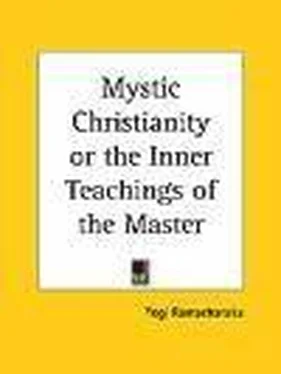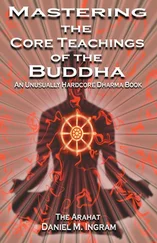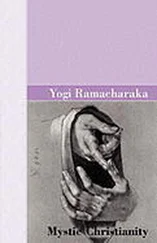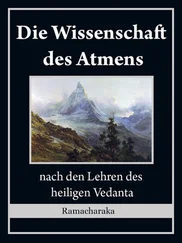The Secret Doctrine of Christianity did not originate with Jesus, for He, Himself, was an Initiate of Mysteries which had been known and taught for centuries before His birth. As St. Augustine has said:
"That which is called the Christian Religion existed among the ancients _and never did not exist_, from the beginning of the human race until Christ came in the flesh, at which time the true religion which already existed began to be called Christianity."
We would like to quote here a few paragraphs from the writings of a well known writer on religious subjects, with which statement we heartily agree, although our views on certain other points of teaching do not agree with those of this writer. He says:
"It may be said that in the present day these doctrines are simply not taught in the churches; how is that? It is because Christianity has forgotten much of its original teachings, because it is now satisfied with only part, and a very small part, of what it originally knew. 'They still have the same scriptures,' you will say. Yes, but those very scriptures tell you often of something more, which is now lost. What is meant by Christ's constant references to the 'Mysteries of the Kingdom of God '-by His frequent statement to His disciples that the full and true interpretation could be given only to them, and that to others He must speak in parables? Why does He perpetually use the technical terms connected with the well known mystery-teaching of antiquity? What does St. Paul mean when he says, 'We speak wisdom among them which are perfect'-a well known technical term for the men at a certain stage of initiation? Again and again he uses terms of the same sort; he speaks of 'the wisdom of God in mystery, the hidden wisdom which God ordained before the world began, and which none even of the princes of this world know'-a statement which could not by any possibility have been truthfully made if he had been referring merely to ordinary Christian teaching which is openly preached before all men. His immediate followers, the Fathers of the Church, knew perfectly well what he meant, for they all use precisely the same phraseology. Clement of Alexandria, one of the earliest and greatest of all, tells us that 'It is not lawful to reveal to the profane persons the Mysteries of the Word.'"
"Another consideration shows us clearly how much of this early teaching has been lost. The church now devotes herself solely to producing good men, and points to the _saint_ as her crowning glory and achievement. But in older days she claimed to be able to do much more than that. When she had made a man a saint, her work with him was only just beginning, for then only was he fit for the training and teaching which she _could_ give him then, but cannot now, because she has forgotten her ancient knowledge. Then she had three definite stages in her course of training-Purification, Illumination and Perfection. Now she contents herself with the preliminary Purification, and has no Illumination to give."
"Read what Clement says: 'Purity is only a negative state, valuable chiefly as the condition of insight. He who has been purified in Baptism and then initiated into the Little Mysteries (has acquired, that is to say, the habits of self-control and reflection) becomes rife for the Greater Mysteries for the Gnosis, the scientific knowledge of God.' In another place he says: 'Knowledge is more than faith. Faith is a summary knowledge of urgent truths, suitable for people who are in a hurry; but knowledge is scientific faith.' And his pupil Origen writes of 'the popular, irrational faith' which leads to what he calls physical Christianity, based upon the gospel history, as opposed to the spiritual Christianity conferred by the Gnosis of Wisdom. Speaking of teaching founded upon historical narrative, he says, 'What better method could be devised to assist the masses?' But for those who are wise he has always the higher teachings, which are given only to those who have proved themselves worthy of it. This teaching is not lost; the church cast it out when she expelled the great Gnostic Doctors, but it has nevertheless been preserved, and it is precisely that Wisdom which we are studying-precisely that which we find to answer all the problems of life, to give us a rational rule by which to live, to be to us a veritable gospel of good news from on high."
St. Paul indicates the existence of the Secret Doctrine of Christianity, when he says to the Corinthians:
"And I, brethren, could not speak unto you as unto spiritual, but as unto carnal, as unto babes in Christ. I fed you with milk, not with meat; for ye were not yet able to bear it; nay, not even now are ye able, for ye are yet carnal." (_I Cor. 3:1._)
Jesus said: "Give not that which is holy unto the dogs, neither cast your pearls before the swine, lest haply they trample them under their feet, and turn and rend you." (_Matt. 7:6._)
St. Clement of Alexandria has said regarding the above saying of Jesus:
"Even now I fear, as it is said, 'to cast the pearls before swine, lest they tread them underfoot, and turn and rend us.' For it is difficult to exhibit the really pure and transparent words respecting the true Light to swinish and untrained hearers."
In the first century after Christ, the term "The Mysteries of Jesus" was frequently used by the Christian teachers, and the Inner Circle of Christians was recognized as a body of advanced souls who had developed so far as to be able to comprehend these mysteries.
The following passage from St. Mark (4:10-12) is interesting in this connection:
"And when He was alone, they that were about Him with the twelve asked of Him the parables. And He said unto them, 'Unto you is given the mystery of the kingdom of God: but unto them that are without, all things are done in parables: that seeing they may see, and not perceive; and hearing they may hear, and not understand.'"
The same writer says (4:33-34):
"And with many such parables spake He the word unto them, as they were able to hear it; and without a parable spake He not unto them; but privately to His own disciples He expounded all things."
Jesus said to His disciples (_John 16:12._): "I have yet many things to say to you, but ye cannot bear them now." The Occult Teachings state that when He returned in His astral form, after the crucifixion, He taught them many important and advanced mystic truths, "speaking of the things pertaining to the kingdom of God." (_Acts 1:3._)
The early Christian Fathers spake and wrote openly regarding the Christian Mysteries, as all students of Church History well know. Polycarp, Bishop of Smyrna, writes to certain others hoping that they are "well versed in the sacred Scriptures and that nothing is hidden from you; but to me this privilege is not yet granted." (_The Epistle of Polycarp, chapter 7._) Ignatius, Bishop of Antioch, says that he is "not yet perfect in Jesus Christ. For I now begin to be a disciple, and I speak to you as my fellow disciple." He also addresses them as being "initiated into the Mysteries of the Gospel, with St. Paul, the holy, the martyred." Again:
"Might I not write to you things more full of mystery? But I fear to do so, lest I should inflict injury on you who are but babes. Pardon me in this respect, lest, as not being able to receive their weighty import, ye should be strangled by them. For even I, though I am bound and am able to understand heavenly things, the angelic orders, and the different sorts of angels and hosts, the distinction between powers and dominions, and the diversities between thrones and authorities, the mightiness of the aeons, and the preeminence of the cherubim and seraphim, the sublimity of the Spirit, the kingdom of the Lord, and above all the incomparable majesty of Almighty God-though I am acquainted with these things, yet am I not therefore by any means perfect, nor am I such a disciple as Paul or Peter."
Читать дальше












